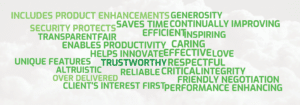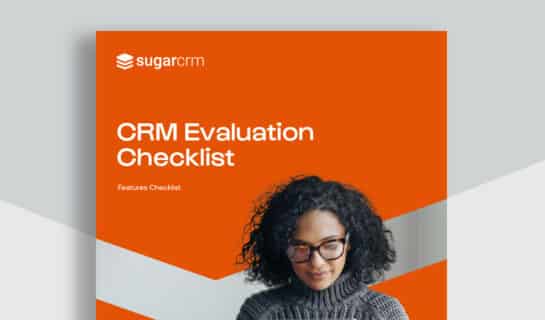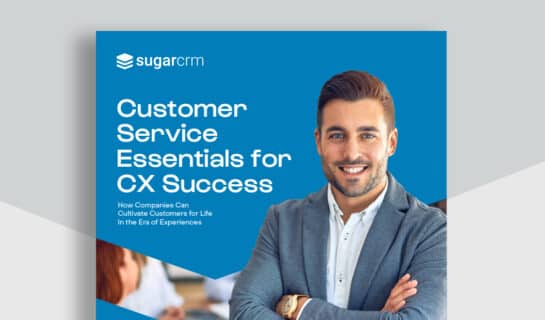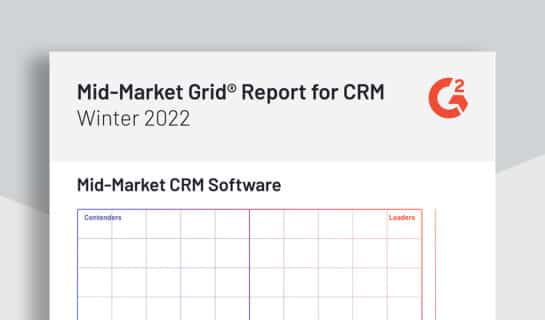Pressing the Reset Button on Customer Emotions and the CRM Industry
Did you know that 95-percent of people make decisions based on emotion? When it comes to business, we may not always make conscious emotionally-motivated decisions but we do have a clear emotion when it comes to the products and software that we use to get work done.
 A CRM is essential to business, it allows sales to keep up with conversations, customer service to identify installations to handle issues, and marketing a place to hand over leads. In fact, CRMs are touched by almost every member of an organization to do their job. If this software is so essential, then why do customers have an emotionally negative response to it? The word cloud pictured is the sentiment that many people have regarding the CRM industry. Some of the words that jump out are disrespectful, lack of integrity, stagnant, greedy, deceptive…and this list goes on.
A CRM is essential to business, it allows sales to keep up with conversations, customer service to identify installations to handle issues, and marketing a place to hand over leads. In fact, CRMs are touched by almost every member of an organization to do their job. If this software is so essential, then why do customers have an emotionally negative response to it? The word cloud pictured is the sentiment that many people have regarding the CRM industry. Some of the words that jump out are disrespectful, lack of integrity, stagnant, greedy, deceptive…and this list goes on.
Each one of these words is negative on their own right but together, it paints a dismal picture of how people view CRMs today. Where did it go wrong? While we discussed why people hate CRMs, there’s more to this story and it’s easy to divide into two areas—the company and the product.
Emotions and the CRM Industry
How people feel emotionally towards a brand also reflects how they receive their products. Companies like Exxon and BP know this all too well due to the oil spills that happened in 1989 and 2010 respectively. To this day, residents of each location are still scarred by the spill itself but also the brand response and it has affected the companies as they’ve moved on. Now, these are an extreme example but can and do affect how people feel about brands because they make a phycological imprint of which the effect is evident in our decisions.
How we perceive a brand is deeply imprinted on the psyche–meaning that we have both conscious and nonconscious thoughts about a brand that influences decisions according to research. Regardless of the new information we receive, it’s difficult to change opinions of a brand but what’s more is that an industry, like the CRM industry, can fall prey to a collective opinion due to the view of some of the industry brands. But because of necessity, these industries and brands persist leaving customers unsatisfied and bitter. Which is exactly where the CRM industry falls looking at the graphic, customers are fed up with the majority of the CRM industry but keep going back because CRMs are essential to business.
Many CRMs still exist on this idea of being a necessary evil and, as a result, deliver poor customer experiences and a complicated yet archaic product. For years, the majority of brands in the CRM industry have remained complicated Rolodexes to track business accounts with innovation that meets minimum standards set arbitrarily. Their customers ask for changes as their business model has adjusted or a product roadmap and are met with additional fees, customized but broken installations, or silence. CRM providers typically take a Frankensteinian approach to modifications by putting a bandaid on the system instead of debugging the solution which adds both cost and complexity to the customer installation. Not only does this beget a poor CX, but it also damages a brand and the industry as a whole and creating a negative mental association for customers. Customers often create workarounds so they can keep moving to meet business needs, during which there no longer is a single source of truth (as is the CRM mantra) due to far fewer customer interactions being recorded in the CRM because of its poor UI. As employees use different, friendlier methods to record customer interactions, companies begin to lose their control over the customer experience.
With all of these issues and perceptions of the CRM industry, it’s no wonder that brands are viewed poorly in this space.
Changing the Story
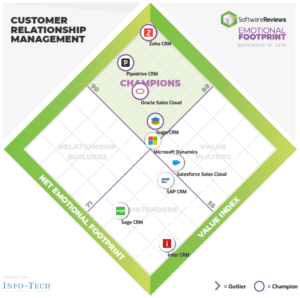
As customers search for a new CRM, data and unbiased information become key to making a decision since emotionally, the industry is viewed roughly the same. Popular review sites and reports become key areas of information where customers seek unbiased opinions when it comes to brands. While a brand can pay for reports, those based on feedback from actual users provide an unbiased look at the industry to reveal those who break the industry mold. The CRM Emotional Footprint by Info-Tech aggregates user insight provides a more overall view of the industry and demonstrates which companies are making a difference in the CRM industry. The quadrant pictured is based on the data summarizes that SugarCRM is considered a champion among the current CRM providers available today. We are no longer just a CRM solution. Embracing full customer experience management to offer an end to end solution, Sugar is seeking to change the story surrounding the CRM industry.
But it’s not about what we at Sugar say about ourselves and our service—it’s about what our customers say. Stepping back from the marketing spin and looking behind the curtain, the Emotional Footprint directly reflects our customer feedback, aggregated by a third-party without bias, making it an essential tool to evaluate a CRM platform.
At Sugar, changing the story isn’t about us, it’s about our customers. What our customers are saying about Sugar proves that we are starting to change the outlook of the CRM industry, one customer, at a time. In contrast to the industry word cloud above, our customers are saying something different about us:
Learning Directly from Customers
The stark contrast from the industry word cloud is evident but the real secret is the why behind that difference. At Sugar, we place customers at the heart of our CX solution, listening and gathering feedback from conversations and interaction to incorporate them directly into our roadmap.
From these experiences, we’ve learned some important insights:
1. Data insights are needed immediately
With companies relying more and more on data, they’re also relying more and more on making decisions via data. The downside to this is that CRM solutions can show you where the data is now but without historical and predictive analysis, it can’t provide the insight needed to choose the next best action. To find those insights, companies rely on data scientists and complex, cult-like technologies that require extreme specialization but this is often delayed and outside the window of that information requirement. Out of this need, Predictive Forecasting was born. An intuitive, easy to use tool, Predictive Forecasting sources insight straight from the data within your CRM without the need for complex technology, creating a system of value rather than a system of record.
2. Everything needs to be in one place
One of the biggest challenges with many CRM solutions is the fact that multiple technologies have to be put together in order to track the customer journey, customer renewals, and customer support requests. Each team uses a different technology that doesn’t integrate well with one another and sometimes, critical accounts all through the cracks. By adding these issues to our product roadmap at Sugar, we were able to develop useful tools like the Renewals Console to directly signal account managers when to begin the conversation about renewing a customer subscription. Plus additional CX tools like Sugar Market and Sugar Serve which tackle CX from every angle of engagement—creating a unified experience throughout their time at Sugar.
3. Transparency and honesty are required
Perhaps though, the most important lesson that we learned from our customers is that they want the truth and they want transparency even when we don’t have something they need at Sugar. Companies who continually push and pressure during sales conversations without listening or fail to admit when they don’t have a key functionality are hurting customers in the long run. The result is the negative industry image that many people have of CRMs today—a necessary solution that customers love to hate. At Sugar, we’re changing that because we believe that not every solution is one-size-fits-all and there may be functionality that you need which isn’t a key part of our product roadmap. We’re resetting the trust meter to provide the best solution for you because your company’s success is our success and we don’t want a short-term relationship or solution. From showing our product roadmap to understanding the feedback and functionality of Sugar, we want to earn your business through our integrity and promise to your success.
4. Innovation must be continual
We are constantly innovating at Sugar because we know that companies don’t stop innovating and changing alongside the market. From our secure cloud integration solutions to added functionality to communicate with key business systems like Microsoft and Google Suite, there is always room for improvement in our technology. By constantly innovating and improving our CX solutions, we walk in stride with organizations to be a partner rather than just a vendor.
Evaluating Based on Facts, Not Emotion
When it comes to evaluating a CRM provider, resources and industry reports like Info-Tech’s Emotional Footprint for CRMs are key to helping you find a solution that’s right for you and your company. Asking the right questions and facing how your company is using your current solution are key ways to learn if it’s time to reevaluate your current vendor for something new. Are they innovating? Are they treating you well? Are they listening? What integrations do they offer? Are you patching the solution with more technology? What is your ROI for your CRM platform?
Ask the hard questions and find out if it’s time to reevaluate your CRM solution. If you’re not sure, reach out to us at Sugar and we will help you find the solution that’s best for your organization, even if it’s not ours.




